
Publisher: THQ
Developer: 4A Games
MSRP: $49.99
by: Sam Tyler
Russia has the reputation of being a bit bleak at the best of times, so forcing the people of Moscow underground after a nuclear war seems a little excessive. This is the premise that greats the player as they begin Metro 2033. You play as Artyom, a man who was raised in the Metro system of this once great city. People are forced to remain in pockets of humanity within safe Metro Stations as the surface and tunnels contain mutated creatures, warring factions and deadly gas. Despite these horrors, Artyom must travel the system to help save his home from a new and darker threat.
On the face of it Metro 2033 is a typical First Person Shooter (FPS), as you travel around shooting the various humans and monsters that get in your way. However, describing this game in such a manner is doing developers 4A Games an injustice, as there is far more depth on offer than in your usual run and gun game. Metro 2033 is instead a mix of a psychological horror such as Silent Hill, and quality intelligent shooter such as Bioshock. However, the game is not able to hit the highs of either of these series’ peaks.
There are plenty of elements that make Metro 2033 stand out over many of its FPS contemporaries. The story is far stronger than in most games in the genre, as it is based on Russian author Dmitry Glukhovsky science fiction book of the same name. 4A Games have taken the essence of the Metro 2033 book and successfully put it in a game. In terms of atmosphere, not since Rapture or The Ishimura have I felt so claustrophobic and alone. Graphically, the game also impresses; the world is shades of brown, but you can not deny that 4A’s own engine makes the deterioration of a once noble city look great.
It is in other areas that the game falls just shy of being a classic. For a game that has strong shooting roots, the gunplay feels a little off. There are plenty of innovative ideas in the game, such as having to constantly recharge your torch battery or pneumatic weaponry, but when the basic act of shooting someone fails to have the impact you wanted, the game can fall flat. It can take several well aimed rounds for an enemy to go down, and in a game where ammo is rare and is also used as currency this can be a real problem. The flaky nature of the shooting meant that I sometimes found myself running around in a panic and, although this increased the tension, I felt that 4A Games had cheated by giving me weaponry that was close to useless.
The other area of misgiving I have is with the pacing. At times the game rattles along with a series of fantastic set pieces that has you glued to your joypad, but on other occasions you are forced to sit through minutes of slow explanation. This is designed to build the tension and further the story, but for me there was far too much down time. Levels that have you fighting alongside an AI ally stood out as you felt safer in their company, if they were to leave, or die, you suddenly felt very much alone. Overall, the pacing in the game felt like being in a car with a learner driver; you stop, and then jerk forwards. Although the sensation of being thrust forwards is an exciting one, it is also a bit confusing and unsettling after you have been still for so long.
There are many new ideas and interesting gameplay elements in Metro 2033 to make it worth playing. When the tension is heightened and you are all alone, the game has some great moments. The issues start when 4A Games try to force the world upon you. The atmosphere in the level design is strong enough on its own that long talky sections are not needed. This in turn affects the pacing of the game so I was bored one minute, exhilarated the next. Very close to a must buy, but not quite.
Score: 